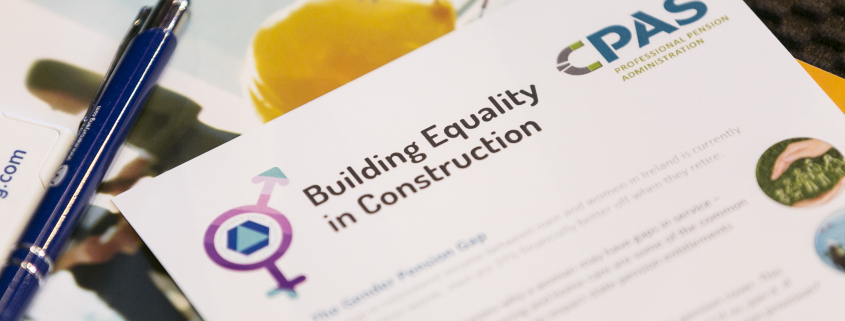By the time you are reading this piece, the third flagship #BuildingEquality campaign event from the Construction Industry Federation will have taken place on International Women’s Day. The purpose of this is to recognise the women that already work in the construction industry and make them visible so that other women may a career in the consider the industry. If this happens, we may see many more young women and girls making choices in school and university that lead them to a career in the construction industry.
Representation matters. Only 5% of those working in the industry are women, and so there is some way to go.
Within the CIF Pension Administration Scheme, incorporating Milestone Advisory, Construction Executive Retirement Scheme (CERS) and the Construction Workers Pension Scheme (CWPS), the great majority of the members and clients that we have responsibility for at retirement through the schemes CERS and CWPS and as individuals requiring advice are men. This statistic is unsurprising, given that 95% of the sector are men. As such, we do not have to focus on the gender pension gap as much as other pension providers. Nevertheless, it does exist and in honour of #BuildingEquality, it is the focus of this piece.
What is the Gender Pension Gap?
For women in Ireland, there is currently a gap of 37% of income in retirement between them and their male counterparts. This figure takes into account a number of factors such as a lack of service, lack of coverage, and greater life expectancy.
A lack of service does not mean that a woman has not worked throughout her life. Across her career, she may have gaps in pension service due to maternity leave and shorter working hours during child-rearing years. Women are also likelier to have gaps in service if they have taken time off to care for an elderly or unwell relative. These gaps in service may mean that they do not qualify for the full State pension. They may also equate to gaps in private pension service if they have such a thing in place.
A lack of coverage relates to the number of women who make provision for private pensions when they are working. Women are less likely to join a scheme when offered access. Even when they do, they have lower levels of contribution, owing to both the gender pay gap, which runs at approximately 13% in Ireland, and sometimes different priorities when it comes to expenditure.
Greater life expectancy simply means that as women are expected to outlive men, their pension funds need to last longer and they actually save more because of this.
In previous generations, pension coverage for women may have been worse, through the marriage bar and lack of career opportunities outside the home if they were married. However, defined benefit pension schemes that their spouses may have been included in, did make specific funding provisions for them on the event of their husband’s death in retirement. This is rarely the case anymore, and as the pensions’ landscape becomes more difficult across the board, women’s income in retirement can be greatly impacted.
What is being done to rectify this?
There is much work to be done by Government on the pensions issue to ensure that the prevailing pension policy in Ireland is based on the modern lives of women and men. There is already ongoing discussions about the so called “pensions time bomb” across the industry and in the media. In the meantime it is imperative that armed with this information that people take control of their retirement funding by engaging with the planning process and not relying on either the State pension or a spouse’s pension.
We may also see a greater onus on employers in this area. While many employers already provide access and funding for pension provision for their employees, we are likely to see the introduction of mandatory pensions in Ireland.
If reading this, you are one of the 5% of women working in the construction industry, well then it is time to take action and review your retirement plans. Have you private pension coverage in place? If so, is it adequate? As well as looking at your own plans for retirement income, encourage your colleagues and friends to engage with theirs.
Here to help you navigate your way to financial security.
The Milestone Advisory team are qualified financial services consultants. We specialise in helping professionals in the construction sector and related industries. Our team will work with you to review your finances, explaining your options in clear English.
No jargon – just the facts.
For further information please contact Susan O’Mara via email or phone: (01) 406 8020. Milestone Advisory DAC t/a Milestone Advisory is regulated by the Central Bank of Ireland.





